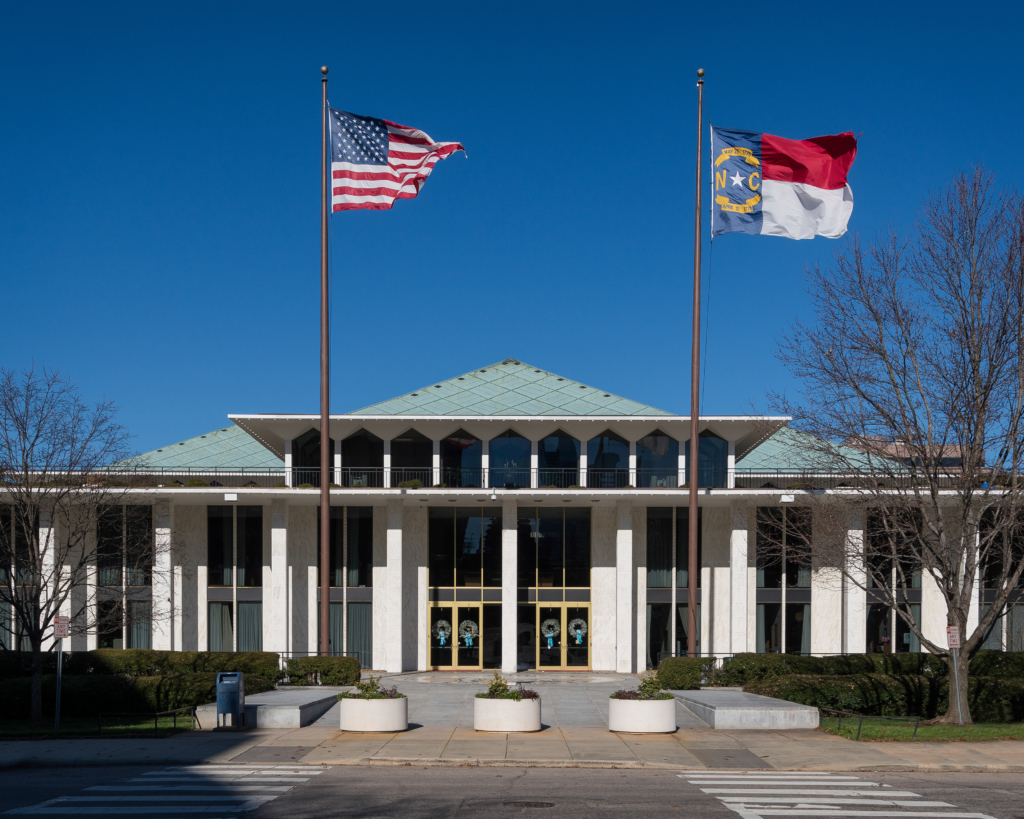NCHC Updates
NCHC staff visited the NCGA on 3/1 and 3/7. We met with elected officials about the state budget, and getting the temperature about the enabling statute for NCHFA, and getting intel on other bills that would impact housing.
- Regarding the NCHFA enabling statute: It appears that leadership on the House side are very on board with protecting this. Our next step is explicitly writing into the budget the protection of this statute to allow NCHFA to conduct business accordingly.
- We do know that there are going to be several significant land use bills this session. They are currently in drafting mode. We will be shifting our energy to doing education around some of the land use issues that we will be facing this session and the impacts they have on housing.
- The House is moving with intention. They initially aimed to have a budget by Easter, but now it seems like the deadline has moved to 5/1.
Save the date for our Legislative Week of Action March 13-17! Check out our post on how to participate here.
Bringing it Home Conference. Registration is open! Join us on May 2 – 3 for the 2023 Bringing It Home: Ending Homelessness in NC virtual conference, featuring Ann Oliva, CEO of the National Alliance to End Homelessness and NCDHHS Secretary Kody Kinsley.
This year’s conference will also include a panel discussion with the NC Balance of State CoC Lived Expertise Advisory Council, a virtual speed networking session, a mindfulness session, and a variety of interactive workshops.
Federal Updates
Advocate for Investments in Affordable Housing for the FY24 Federal Budget.
Add your organization to Campaign for Housing & Community Development Funding’s 302b (budget) letter urging Congress to provide highest possible funding for HUD and USDA housing, homelessness, and community development programs, and to avoid cuts.
Check out NLIHC’s recently published advocacy toolkit on the topic: Oppose Dramatic Cuts to Federal Investments in Affordable Housing.
Bipartisan legislation to expand eligibility for the Historic Tax Credit was introduced last week in the Senate. The bill was filed by Sens. Ben Cardin (D-MD), Bill Cassidy (R-LA), Maria Cantwell (D-WA) & Susan Collins (R-ME). The Historic Tax Credit Growth & Opportunity Act (HTC-GO) is similar to legislation filed by similar names in 2019 and 2021. The bill would expand credit for smaller projects by creating a 30% HTC. It would also eliminate the basis-adjustment requirement and decrease the substantial rehab test threshold.
Rubio introduces affordable housing bills. Last week, U.S. Sen. Marco Rubio (R-FL) introduced 7 bills geared towards improving affordable housing. Most of the bills focus on the health and safety of residents in public housing and Section 8 units.
Senate Democrats urge Biden to further address housing. 17 Democratic Senate Chairs and Majority Leader Chuck Schumer (D) signed onto a letter urging Pres. Biden to “utilize a ‘whole-of-government’ approach to address our nation’s housing needs.” The letter named housing as a critical piece of infrastructure that “is a sector that remains in crisis” and although many decisive steps have been taken to address other infrastructure deficiencies across the nation, “more must be done to address the challenges facing the housing sector”, the letter went on to cite lagging production, aging housing stock, and rising housing costs as just a few of the challenges that face the housing sector and called for this critical issue to be invested in accordingly.
State Updates
State of the State. Governor Roy Cooper delivered his final State of the State on 3/6. In his speech, he highlighted investments in education, infrastructure, the economy, and the workforce, and bipartisan efforts to reach an agreement last week on state Medicaid expansion. Part of the agreement was that Republicans wanted it to be tied to the state budget, which means it won’t be finalized for a while and will be used as a bargaining chip.
Thousands of affordable housing units across NC are aging out of the period of mandated affordability. A recent article in the Charlotte Observer dives into the significant projected loss of affordable housing units in the coming years as tax credit properties age out of their period of mandated affordability. Over the next 5 years, affordability mandates will expire for over 7,000 units across the state.
Local Updates
Pisgah Legal Services is recruiting for its first class of housing fellows. The fellowship provides WNC lawyers with free training on landlord/tenant law and 5 hours of continuing legal education credits. Upon completion of the program, housing fellows are able to take pro bono cases in small claims and district courts where they are licensed to practice. The program’s creation is in response to a rising demand for housing-related assistance. Last year, Pisgah Legal received over 3,000 applications from WNC residents seeking assistance with housing-related matters.
Duke Energy is asking state regulators to approve a 17% rate hike. This request, in addition to a 10% rate hike request filed in January, brings Duke Energy’ requested rate increase to 27%. While unlikely to be granted in full, a 27% rate hike would increase a typical household’s monthly bill by about $32. Duke Energy Progress is expected to file a similar request over the summer.
In the City of Washington, NC, the Neighborhood Revitalization Program plans to complete construction of its first house soon. The program is a partnership between the Washington Housing Authority and the City of Washington that increases homeownership opportunities for low to moderate income families in Beaufort County.
A property manager in Onslow County is threatening to evict tenants who do not pay requested utility increases that were instated to cover the property owner’s outstanding utility debt to the City of Jacksonville. The City has spoken out against the property manager’s actions and tenants are working with the Onslow County chapter of the NAACP, Onslow Community Outreach, and U.S. congressman Greg Murphy’s (R-NC-03) office to reach a resolution.
The City of Wilmington will hold a hearing on March 7 about plans to use $2.5M in HOME-ARP funds to support affordable housing development, tenant based rental assistance, supportive services, and the creation of non-congregate shelter units.
Haywood County receives additional Federal funding for affordable housing. Haywood County recently received an additional $4M in CDBG-DR funds. Like the previous $7M tranche of funds the County received, these funds will be for affordable housing in response to the severe damage and loss of houses experienced in August 2021 from Tropical Storm Fred. Funds can be used for affordable housing activities, including first-time homeowner down payment assistance, renovations and repairs, preservation of affordable housing, property acquisition, and LIHTC multifamily construction.
DFI presents affordable housing market analysis findings to Buncombe County. At last week’s Buncombe County Commissioners meeting, staff with the Development Finance Institute (DFI) at UNC – Chapel Hill’s School of Government presented findings from their affordable housing market analysis. DFI identified 4 county-owned properties with potential for affordable housing development.
The need is clear for affordable housing in Buncombe County. Our 2022 County Profiles indicate that the highest housing wage in the state is in the Asheville metro area, where a family must earn an hourly wage of $28.19 to afford a modest 2 bedroom apartment. In addition, DFI’s findings suggest that almost 1,000 affordable apartments in Buncombe County will age out of their period of mandated affordability in the next 10 years.
New tax-credit property opens in Charlotte. The City of Charlotte recently celebrated the opening of Sundale Flats, their newest affordable housing community. The development adds 180 units of affordable housing for Charlotte residents earning at or below 80% of the Area Median Income (AMI).
Winston-Salem displaces low-income residents during renovation of city-owned apartments. The City of Winston-Salem is asking residents at two city-owned apartment communities to move out by the end of May while major repairs and renovations are underway. The buildings are more than 50 years old and have not undergone significant renovations in over 30 years. The city is offering to pay relocation expenses for residents and is offering rent forbearance for next 3 months. In addition to housing search and counseling services provided by the City and Financial Pathways of the Piedmont, residents are eligible to receive compensation for the difference in their current rent and new rent up to a certain amount.
Residents and organizers from Housing Justice Now are asking the City to complete exterior safety repairs and allow residents to remain in their units, citing the lack of comparably priced units in the area.
Greensboro starts the conversation about Community Land Trusts. The City of Greensboro’s Housing & Neighborhood Development Department invites residents, lenders, and community partners interested in learning more about Community Land Trusts and affordable housing to attend one of the Community Land Trust sessions in mid-March.
Events
- [in-person] Ceremonial Check Presentation from the NC Workforce Housing Loan Program, 3/10, 11 a.m., 370 Blue Creek School Road, Jacksonville, NC
- [in-person] Housing Policy Forum 2023 | NLIHC, 3/21-3/23 in Washington, D.C. Features discussions with Congresswoman Pramila Jayapal (D-WA), chair of the Congressional Progressive Caucus, FHFA Director Sandra Thompson, Treasury Deputy Secretary Wally Adeyemo, Matthew Desmond, and NC’s own Rev. Dr. William Barber II.
- [virtual] Housing Finance and Social Equity : Learning from Ginnie Mae | Joint Center for Housing Studies of Harvard University, 3/21, 11 a.m.
- [virtual] Improving America’s Housing 2023 | Joint Center for Housing Studies of Harvard University, 3/23, 12:30 p.m.
Reports & Resources
- 2023 Advocate’s Guide | National Low Income Housing Coalition
- Research Grows Linking Housing Insecurity and Childhood Well-being | NC Housing Finance Agency
- As Market Rate Multifamily Starts Near Record Highs, Affordable Housing Community is Assessing Effects on LIHTC-Financed Properties | Novogradac
- How is Digitalization Transforming How People Find and Finance Housing? | Joint Center for Housing Studies of Harvard University
- Preliminary Overview of the AFFH Equity Plan | NLIHC
- Preliminary Overview of AFFH Community Engagement and Complaint Processes | NLIHC
- How States Are Incentivizing Local Housing Production: A Typology of State Pro-Housing Laws | Terner Center for Housing Invocation at UC Berkeley
In the News
- Senators eye housing bills for bipartisan tax policy push | Bloomberg
- The average American tenant is rent-burdened. Here’s what that means for the economy | The Hill
- Egg prices and rents—what do they have in common? | Shelterforce
- The effort to diversify the field of home appraisal | WUNC
- WeBuild Concord acquires historic church for affordable workforce housing and entrepreneurs | WBTV
- Durham’s ‘SCAD:’ Good or bad? | INDY Week
- Marian Cheek Jackson Center preserves Chapel Hill’s Black history, provides resources | The Daily Tar Heel
- Durham Housing Authority plans to tear down McDougald Terrace, needs feds OK | CBS17
- How former President Carter’s legacy through Habitat For Humanity impacts Eastern North Carolina | WNCT








